The addition of nutrient-rich animal manure to fields and pastures has been known for centuries to enrich the soil and increase crop production. Until a few years ago, cow and horse manure were the only kinds of manure readily available. However, urban farming has become popular with goats. In addition to creamy milk for cheese, there is a steady fertilizer supply for the garden. For healthy soil and plants, goat manure is one of the best animal manures. Let’s check out how to make Goat manure compost.
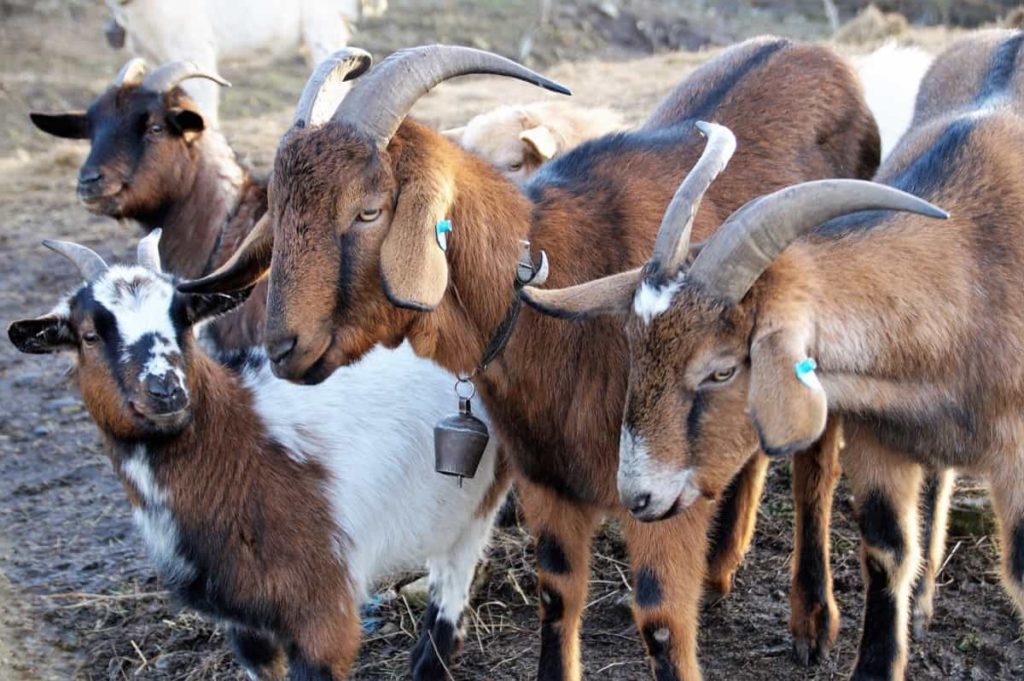
Homesteaders, small farmers, and backyard gardeners can create rich soil amendments for their gardens and flowerbeds by composting goat manure. The organic matter in goat manure makes it an attractive compost choice for many gardeners because goat manure contains fewer weed seeds than most other animal manures. The garden soil should be amended with goat manure approximately six months before planting.
Ideally, it should be done during early fall. It is possible to maximize the growth of plants by using goat dung in garden beds. Natural dry pellets are easier to gather and apply and leave a cleaner surface than other types of manure. The manure from goats can be used as fertilizer for flowering plants, herbs, vegetables, and fruit trees, among other things. Mulch can also be made from goat manure, which is compostable.
The manure of goats is not only neater than that of cows or horses but also doesn’t attract insects or burn plants like cows or horses. As well as being odorless and rich in nutrients, goat manure contributes to plants’ maximum growth. In addition, the manure absorbs more nitrogen by accumulating urine in goat droppings, making it a more effective fertilizer. The nitrogen content of these materials usually necessitates composting before use.
In case you missed it: A Guide to Understand the Composting of a Garden/Farm: Check How this Guide Helps Gardners/Farmers
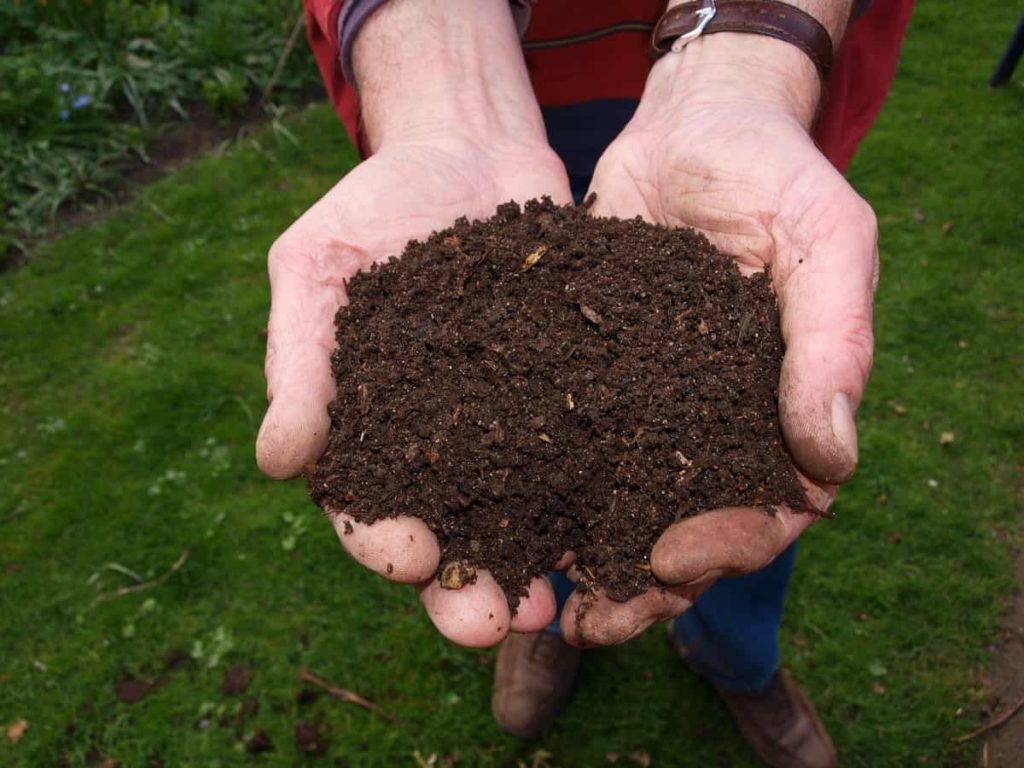
How to make Goat manure compost
Nutrients in goat manure
Fertilizers for pastures, fields, and grass production can be obtained from animal manure, which is widely regarded as an agricultural commodity. In general, compost is an excellent source of plant nutrients nitrogen (N), phosphorus (P), and potassium (K) and helps grow plants. Additionally, compost replenishes soil fertility and quality by replenishing organic matter and nutrients such as calcium, magnesium, and sulfur.
The compost’s nutrient content depends on the type of animal and food, the type and amount of bedding, the moisture content, and the storage method. The nutrients in goat manure are higher than those in other animal manures, for instance. Manure from this source is also used with cow manure since it is readily available in large amounts.
Typical nutrient composition of goat manure
| Manure | Nitrogen (N)% | Phosphorus (P)% | Potassium (K)% |
| Fresh goat manure | 1.34 | 0.54 | 1.56 |
| Composted goat manure | 2.23 | 1.24 | 3.69 |
| Goat urine | 1.13 | 0.05 | 7.9 |
How to compost goat manure
Generally, goat dung cannot be added directly to the soil, as it contains pathogens, parasites, parasitic eggs, and other potentially harmful substances. Conversely, fresh goat excrement may decompose in the soil, releasing heat that scorches plant roots. In contrast, goat dung composted before the application will be digested by microorganisms and turned into nutrients. In addition, Composting produces a high temperature of 60 to 70°C, killing pathogens and parasites in hazardous materials.
It is similar to composting any animal waste to compost rich hot goat manure. A garden can benefit significantly from goat manure added directly in the fall. Microorganisms play a crucial role in composting. These bacteria use oxygen and water to convert organic materials into nutrition. Additionally, the bacteria will die if the heat they generate is too high. Composting goat manure with 50-60% moisture content is ideal. It is essential to consider the temperature and oxygen concentration. Composting goat manure involves the following steps:
In case you missed it: Fertilizer Management in Potatoes: Organic, Compost Manure, NPK, and Schedule
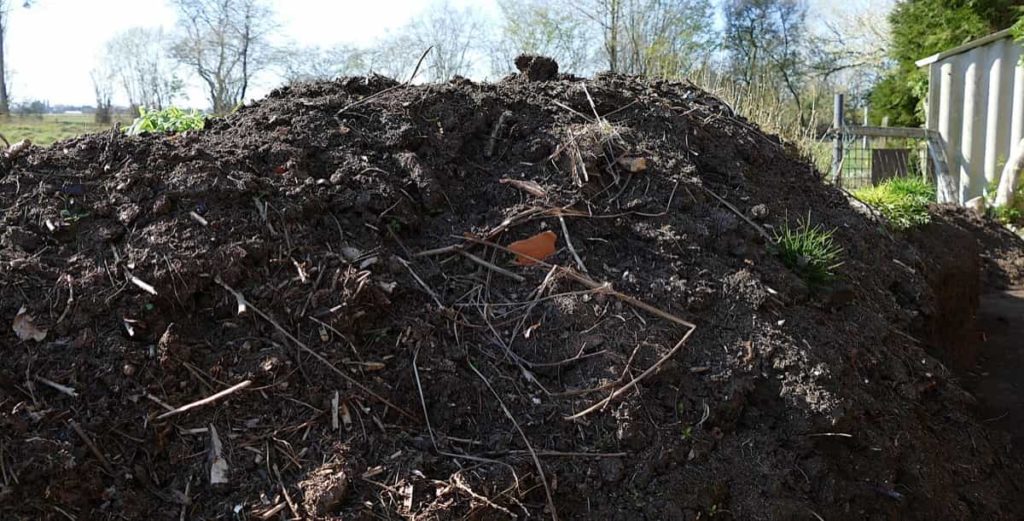
- Prepare the basic materials for composting. Auxiliaries, such as sawdust and straw, can be added to goat manure.
- Maize flour gives glucose to microorganisms and fermented culture, and rice husk controls moisture, air permeability, and C/N ratio and should be evenly combined.
- Second, goat manure and auxiliary materials such as sawdust and straw can be stacked together. They can be stacked in long beds or put into fermenting grooves.
- Windrow compost piles are typically at the height of 0.8 to 1.5 m, 1.5 to 2 m in breadth, and 2 m or more in length.
- Lastly, until the fermentation is complete, turn the compost pile continuously. It is adequate to do it 2-4 times each day for the first week and once every two days for the subsequent weeks.
Once composted, goat manure compost is safe and valuable. Manure tea can also be made from it or added to other scraps in the compost bin. Composting is the natural decaying of organic matter into a dark, loose, soil-like substance that can be used to enrich gardens. Further, it is a natural recycling process that occurs continuously in nature, thus reducing household waste significantly.
Using goat manure for fertilizer
Plants require a balance of nutrients for maximum growth, and this manure provides them with that. Further, goat droppings absorb more nitrogen, increasing the effectiveness of manure as a fertilizer. The best way to enrich the soil is to use goat manure in garden areas. Because it is pelletized, it can be applied directly to flower and vegetable gardens without burning them. As well as being easy to spread and till into the garden, pellets are also easy to handle.
Add more or less goat manure, depending on the plant’s growth throughout the season, to spring beds in equal parts of goat manure, sand, and straw. One of the effective methods to enhance soil is to add fresh goat manure directly to garden areas. The goat manure fertilizer should be applied to the garden in the fall and allowed to soak into the soil over the winter. In garden supply centers, local farms, and retailers, goat manure fertilizer is available.
In addition to allowing more airflow into compost piles, goat manure for fertilizer accelerates composting time due to pelletized droppings. Composting goat manure requires working on the pile throughout fall and winter for spring application or taking out what is needed for a given job until composting is complete.
Manure tea making with goat manure
Traditionally, manure tea is made with dried non-medicated goat manure by throwing everything into a container. Using this method is the conventional way and is relatively straightforward.
- First, prepare a bucket or big container for five gallons of water.
- Then, fill some water in the container accordingly.
- Next, add some goat manure pellets to the bucket of water.
- Wait for 15-20 mins to soak these pellets in the water
- Stir the manure in the bucket using a long stick once a day.
- Leave it for some hours until the manure settle downs at the bottom.
- Once the manure goes down to the bottom, then pour the manure tea liquid into other containers.
- Finally, the manure tea fertilizer is ready to use. Need to dilute this tea before using it for tender plants.
In case you missed it: Best Fertilizer for Herbs: Organic, Compost, Liquid, NPK, How and When to Apply
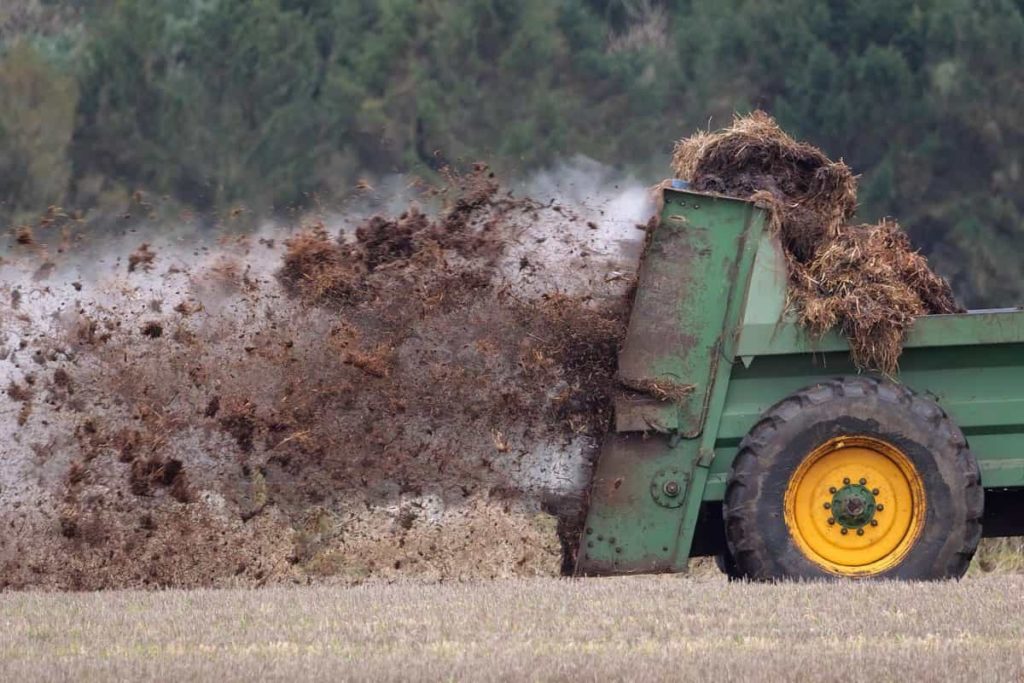
Using goat manure for gardens
Manure from goats is an excellent source of nitrogen (N), phosphorus (P), and potassium (K) for plants. Manure also returns organic matter and nutrients such as calcium, magnesium, and sulfur to the soil, increasing fertility. Like sheep manure, goat manure is drier than cow manure or horse manure.
As a result, there is less odor, and easier to work with and spread. Additionally, it composts more quickly. Compared to horse and cow manure, goat manure contains a higher level of nitrogen and potassium. There are 22 pounds of nitrogen in one ton of chicken manure, compared to 10 pounds in a ton of cow manure.
Goat manure application as organic fertilizer
There is no guarantee that goat manure is safe because it is a natural product. A large amount of it can run off into groundwater, potentially contaminating it. Avoid using it on sloped areas, significantly when predicted by heavy rains or summer storms. Fresh animal manure, including goat manure, can also contain pathogens that can cause illness.
To ensure that goat manure is well-composted, mainly when it is used for edible crops, use well-composted goat manure. Crops growing close to the ground, such as lettuce or root vegetables, should be harvested after 120 days using goat manure that has been rotted but not composted. Crops that do not touch the soil, such as corn, should be treated at least 90 days in advance.
Benefits of goat manure
- Herbs, vegetables, and other crops benefit from goat manure fertilizer. It has other uses, as well as increasing the water holding capacity of the soil.
- Fertilizing goat compost before use as a soil supplement is recommended. Compost should be made for 4 to 6 months before being introduced into the soil.
- Before harvesting your product and before the composting process is fully compacted, apply it to the ground 120 days before harvesting.
- The nitrogen content of goat manure is higher than that of cow and horse manure since goat manure is drier than cow and horse manure. Therefore, spreads quickly and is easy to work with it.
- Composting goat manure also speeds up the composting process since it allows more air to enter the pile.
- New and existing gardens benefit from goat manure’s soil-building properties. For example, improving soil texture, enhancing water efficiency, and increasing oxygen soil health.
- In addition to providing a natural nitrogen source, goat manure also provides other nutrients.
- In addition to being easy to collect and apply, the pellets are less messy than many other manure types.
- Mulch can even be made of goat manure after composting it.
- Goat manure is commonly used as fertilizer, helping farmers grow healthy fruit crops. The manure of goats is also odorless and beneficial to garden soil.
In case you missed it: Best Fertilizer for Castor Plants: Organic, Compost, NPK, Management, and Schedule
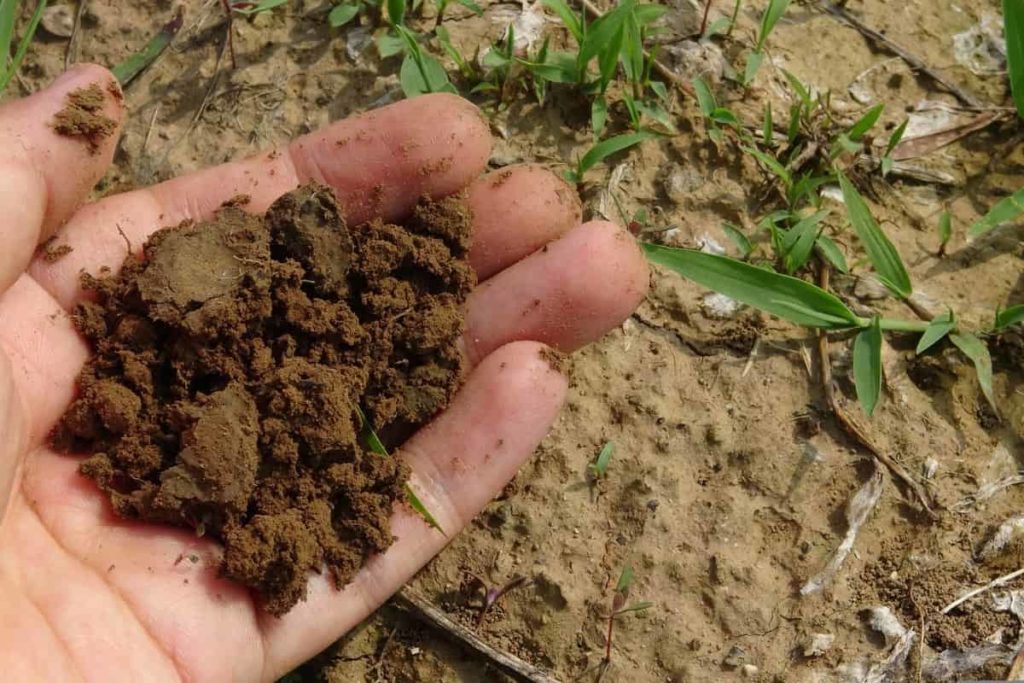
Do you have to age goat manure?
In contrast to the loose crumbly dung of cows, sheep, llamas, and alpacas, goat, sheep, and llama manure are in the form of hard pellets. These pellets are packed with nitrogen and must be aged or composted before tilling into the ground. Furthermore, these animals’ manure is typically collected with their bedding, which is straw, which provides the carbon source needed to balance their nitrogen levels.
Composting goat manure takes approximately six months. Warm temperatures and frequent turning of the pile speed up the process. Using composted manure as fertilizer for gardens and crops is a natural alternative to chemical fertilizers. For plants and gardens, goat manure is an excellent source of nutrients.
Can you put goat manure straight in the garden?
It is lightweight and effortless to handle, making it ideal for working goat manure into garden beds. Early spring is the best time to feed the plants with goat manure in the garden so that the beds will be ready for planting in a few weeks. If you properly feed and care for your goat, it will produce mild but effective manure year after year without too much effort.
Similarly, goat manure tea works well, just like any other manure. The best way to enrich the soil in garden areas is to use goat manure. Because it is pelleted, it can be applied directly to flower and vegetable gardens without burning them. A further benefit of the pellets is that they can be spread and tilled into the soil easily.
What is the pH of goat manure?
The pH of manure, except poultry manure, is significantly reduced by composting. For example, fresh buffalo manure had a pH of 8.7, and composted buffalo manure had a pH of 7.7. Fresh goat manure had a pH of 8.9, and composted goat manure had a pH of 7.8. It may be due to the microbial action that has modified the chemical composition of manure, notably the production of organic acids.
Is goat manure organic?
A goat’s manure provides an excellent source of organic fertilizer for agricultural land and animal protein in the form of meat and milk. The organic carbon content of solid goat manure is 46.58%, the nitrogen content is 1.34%, the phosphorus content is 0.54%, and the potassium content is 1.56%.
The compost’s nitrogen, phosphorus, and potassium content were found to be 2.23%, 1.24%, and 3.69%, respectively, after 30 days of composting. Furthermore, goat urine also contains nutrients such as nitrogen (1.13%), phosphorus (0.05%), and potassium (7.3%).
Is goat poop high in nitrogen?
Spreading and working with it is more manageable and has less odor. Composting is also faster with this material. Additionally, goat manure contains more nitrogen and potassium than horse and cow manure. For example, 1 ton has an average of 22 pounds of nitrogen.
In case you missed it: How Start-ups are Making Agriculture More Sustainable
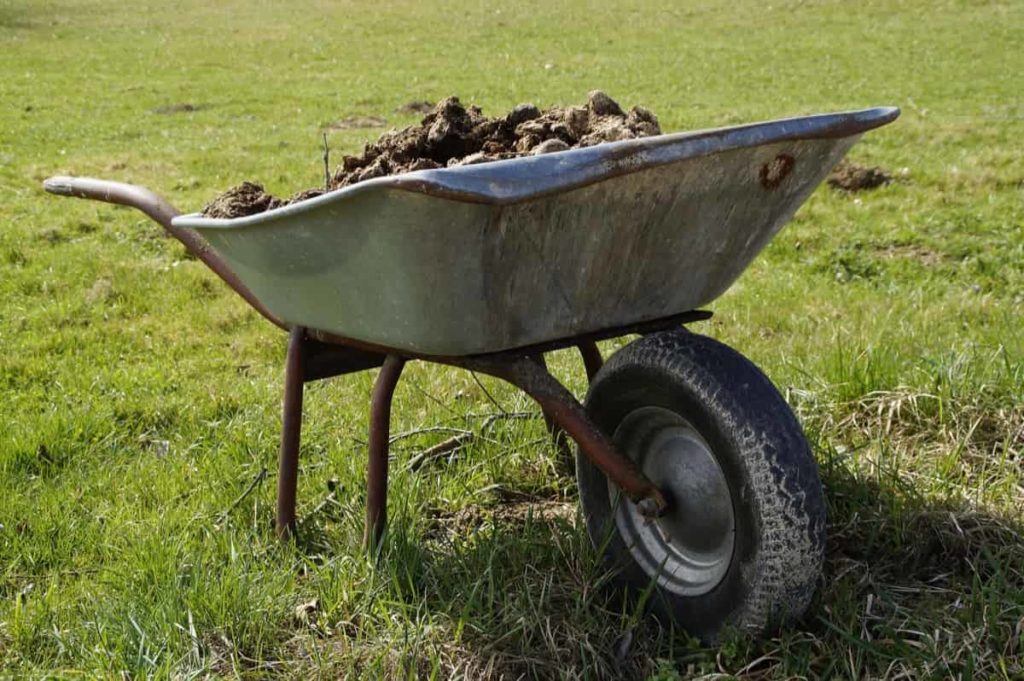
Is goat manure hot or cold?
Ensure the manure has been aged or composted, regardless of the animal from which it comes. The nitrogen in old manure has turned gaseous over time as it has been piled up. Hot manure will be produced from this stocked manure. Plant roots would be burned if hot manure was applied fresh. On the other hand, cold manure can be safely used in the garden. If manure is to be adequately cooled, it must be aged for at least six months before it can be used, except for that from llamas, alpacas, and cattle.
Conclusion
Goat manure is a potent fertilizer used to grow all sorts of crops by commercial and domestic gardeners. Unfortunately, some vegetables like carrots, tomatoes, peppers, and parsnips do not like goat manure before harvesting. However, with some precautions, goat manure can also be used in these crops.
- Types of Pesticides Used in Agriculture: A Beginner’s Guide
- Economical Aquaculture: A Guide to Low-Budget Fish Farming
- 15 Common Planting Errors That Can Doom Your Fruit Trees
- How to Make Houseplants Bushy: Effective Tips and Ideas
- Innovative Strategies for Boosting Coconut Pollination and Yield
- Pollination Strategies for Maximum Pumpkin Yield
- The Complete Guide to Chicken Fattening: Strategies for Maximum Growth
- Natural Solutions for Tulip Problems: 100% Effective Remedies for Leaf and Bulb-Related Issues
- Revolutionizing Citrus Preservation: Towards a Healthier, Greener Future
- Natural Solutions for Peony Leaf and Flower Problems: 100% Effective Remedies
- Maximizing Profits with Avocado Contract Farming in India: A Comprehensive Guide
- Natural Solutions for Hydrangea Problems: 100% Effective Remedies for Leaf and Flowers
- The Ultimate Guide to Choosing the Perfect Foliage Friend: Bringing Life Indoors
- From Sunlight to Sustainability: 15 Ways to Use Solar Technology in Agriculture
- The Ultimate Guide to Dong Tao Chicken: Exploring from History to Raising
- The Eco-Friendly Makeover: How to Convert Your Unused Swimming Pool into a Fish Pond
- Mastering the Art of Delaware Chicken Farming: Essentials for Healthy Backyard Flocks
- 20 Best Homemade Fertilizers for Money Plant: DIY Recipes and Application Methods
- How to Craft a Comprehensive Free-Range Chicken Farming Business Plan
- Brighten Your Flock: Raising Easter Egger Chickens for Beauty and Bounty
- How to Optimize Your Poultry Egg Farm Business Plan with These Strategies
- Subsidy for Spirulina Cultivation: How Indian Government Schemes Encouraging Spirulina Farmers
- Ultimate Guide to Raising Dominique Chickens: Breeding, Feeding, Egg-Production, and Care
- Mastering the Art of Raising Jersey Giant Chickens: Care, Feeding, and More
- Ultimate Guide to Raising Legbar Chickens: Breeding, Farming Practices, Diet, Egg-Production
- How to Raise Welsummer Chickens: A Comprehensive Guide for Beginners
- How to Protect Indoor Plants in Winter: A Comprehensive Guide
- Ultimate Guide to Grow Bag Gardening: Tips, Tricks, and Planting Ideas for Urban Gardeners
- Guide to Lotus Cultivation: How to Propagate, Plant, Grow, Care, Cost, and Profit
- Agriculture Drone Subsidy Scheme: Government Kisan Subsidy, License, and How to Apply Online
- Ultimate Guide to Raising Araucana Chickens: Breed Profile, Farming Economics, Diet, and Care
- Bringing Hydroponics to Classroom: Importance, Benefits of Learning for School Students
- Ultimate Guide to Raising Polish Chickens: Breed Profile, Farming Economics, Diet, and Care
- Ultimate Guide to Raising Australorp Chickens: Profile, Farming Economics, Egg Production, Diet, and Care
- Silkie Chicken Farming: Raising Practices, Varieties, Egg Production, Diet, and Care
- Sussex Chicken Farming: Raising Practices, Varieties, Egg Production, Diet and Care
Good morning. Thank you for this information. Please I would appreciate if I can get a video of how you compost your goat manure, I did not really understand your write up. Thank you very much for your help and response
ನಿಮ್ಮಿಂದ ತುಂಬ ವಿಷಯ ದೊರಕಿತು ತುಂಬಾ ಧನ್ಯವಾದಗಳು